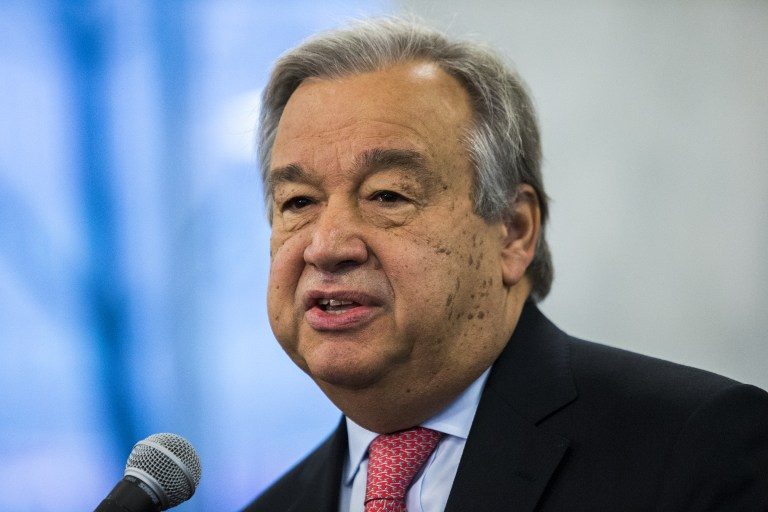SUMMARY
This is AI generated summarization, which may have errors. For context, always refer to the full article.

KATOWICE, Poland – United Nations (UN) Secretary-General Antonio Guterres sought to rescue deeply troubled climate talks in Poland on Wednesday, December 12, warning the battle against global warming is a “matter of life and death today.”
The two-week talks are tasked with breathing life into the 2015 Paris Agreement, which vows to cap global warming at “well under” 2°C (3.6°F), and 1.5°C if possible.
But efforts to elaborate a “rule book” for the Paris pact and boost the carbon-cutting pledges have hit a wall, even as a barrage of scientific reports have warned that only immediate and radical measures can avert even more catastrophic extreme weather.
“The key political issues remain unresolved,” Guterres told ministers and diplomats only 48 hours before the 195-nation meeting in the Polish city of Katowice, in the heart of coal country.
“To waste this opportunity would compromise our last best chance to stop runaway climate change,” he said. “It would not only be immoral, it would be suicidal.”
The Paris pact is also meant to funnel hundreds of billions of dollars to poor countries already feeling the sting of deadly storms, heatwaves, and droughts made worse by climate change.
Scientists have concluded that such impacts are already unmistakable with only 1°C of warming so far.
“The eyes of the world are upon us,” said Guterres, who had not planned to return after addressing the opening plenary 10 days ago but came back to push for progress.
A major scientific report called for by the UN climate body concluded in October that Earth’s rise in temperature must be capped even lower – at 1.5°C – to avoid the danger of runaway warming.
‘Redline issue’
But a handful of countries at the talks, led by the United States and Saudi Arabia, have blocked efforts to endorse the so-called IPCC report, which many developing countries see as essential.
“The IPCC report on 1.5°C is the basis for all future action, on what we need to do,” Vanuatu Foreign Minister Ralph Regenvanu told Agence France-Presse.
Endorsing the report’s findings at the conclusion of the UN forum “is a red line issue for us.”
Other trouble spots include “transparency” – which means different things to different countries, depending on what is at stake.
Rich nations, for example, are pushing hard for high standards of accounting to keep track of emissions reductions. Poorer nations say they need more time – and lots of money – to comply.
But the most contentious issue on the table is the reluctance of many nations – including the Polish government, which as host presides over the complex negotiations – to underscore the need to enhance voluntary carbon-cutting pledges annexed to the Paris pact.
Even if current promises are fulfilled, Earth would heat up by well over 3°C, enough to tug at the fabric of civilization, say scientists.
“Nobody – not even so-called superpowers – can negotiate with the laws of physics,” said Jean-Pascal van Ypersele, a Belgian climatologist and a former vice-chair of the UN Intergovernmental Panel on Climate Change (IPCC), which produced the report on 1.5°C.
‘Ice melts at zero’
A recent study shows parts of the Antarctic ice sheet – which holds enough frozen water to bury every major coastal city in the world – is melting far more quickly than thought only a few years ago.
“Ice melts at 0°C – that’s 32°F,” quipped van Ypersele, converting into the temperature scale used in the United States.
The talks will now focus on hammering out a final text, composed of “decisions,” including one adopting the rule book.
In an attempt to build momentum for stronger action, the 47-strong bloc of Least Developed Countries joined with a couple dozen other nations to revive the so-called High Ambition Coalition that help push the Paris treaty across the finish line.
Missing, however, compared to 2015 were the United States and nearly half the countries in the European Union, suggesting that it will be difficult push.
To break the stalemate in Katowice, the Polish government took control of the process to find compromise language on key sticking points.
But a piecemeal draft text released Wednesday did not inspire enthusiasm among negotiators.
“From what we have seen so far, they have not made any bold moves,” said Miguel Arias Canete, European Commissioner for Climate Action and Energy.
“The issues with the most political interest to most parties remain unresolved and practically unchanged.” – Rappler.com
Add a comment
How does this make you feel?
There are no comments yet. Add your comment to start the conversation.